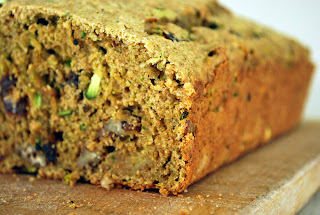
I hate baking. Baking involves following the rules and sticking to the guidelines, something I don't do with my other cooking, or life for that matter. But cooking light dishes with vegetables this whole summer has given me the appetite to create something a little more substantial. Just like I said I'd never marry a farmer, I also vowed never to get into baking. But as my mind has changed about farmers this summer, so it follows with baking. I dove in today and baked zucchini (from the farm, of course) spice bread. And it was delicious. So delicious. The pecan and date niblets inside add a silky and crunchy combination that melds wonderfully with the moist warmly-spiced bread. (recipe from Moosewood's 'Enchanted Broccoli Forest')
I use this event not to tout my newfound baking skills, but rather as an analogy to tell the story about how I got involved with Featherstone Fruits and Vegetables. About how I ended up here, writing about my experience being involved in a community that delivers nearly 600 weekly boxes of organic produce to local consumers. It was a complete leap of faith, a shot in the dark - one that turned out with pleasant results, also.
It all started with a haircut at the Aveda Institute in northeast Minneapolis last fall. As Tuesdays are student discount days, I had a half-hour to kill before I could get in for an appointment. The last thing I wanted to do was linger around the store and smell their awful cologne-like products from the Aveda Store by the waiting lobby. No thanks. So I decided to explore the neighborhood. I noticed this quaint shop whose sign hung attractively on the corer of the building. The sign read "Let's Cook," and the shop was home to a store that sold kitchen equipment and cooking classes. I was sold before I even stepped in the door. After perusing the store I quickly learned this place was way out of a college student's budget, so I asked if there was any other way to get involved with the store - food events, classes, etc. The cashier told me that the cooking demonstrations are run by a volunteer-staff. Needless to say, I turned in my application and in one week I had my first event. I loved this place as I was constantly surrounded by fellow-foodies. A type that is hard to find in my age-range. (But I was quite surprised as about 6 of my friends are now volunteering there.)
As we said goodbye to winter and hello to spring, farmers started to have an increasing presence in the Twin Cities in order to connect with their market. I had recently gotten an assignment from Edible Twin Cities to fact-check their list of CSA Farms for their directory in the next issue. Featherstone was on that list, but at the time they were just a line to get checked off on my list of farms I had to call. I didn't give them any more thought than I did the other farms. At the same time, in order to get the word out about Community Supported Agriculture programs, farmers and farm workers attended a 'CSA Farmer Fair' at Let's Cook. I happened to be volunteering that specific event, when I met Mary Benson - Featherstone's CSA Manager. After we got to talking, we realized that we had talked not a month previous when I was doing the Edible TC piece. (Writing for Edible TC was another leap of faith as I took a shot in the dark by emailing the editor, basically begging to let me help with the publication.) This conversation was followed by a few emails, a few phone calls, and a farm visit. After visiting Zephyr Co-op in Wiscoy Valley, where the farm is located, I was completely sold. Two months later I was trekking around to our different fields with Jack, our farmer, in his pickup, learning about the Farm Bill and ideal vegetable-growing soil conditions. Sure beats an a dry-corporate communications internship at (not naming names) in the bustle of downtown Minneapolis.
Some of the most worthwhile moments this summer have happened to me when I take that one extra step, outside of my zone of comfort, putting to sleep the creature of habit within and waking up the creature of new experience. If I've learned one thing, it's that you've got to insist life to happen - it doesn't just fall into place. Whether it's baking, spending that extra hour after volleyball for good conversation, jumping in the Wiscoy pond with Hugo in our work-clothes, or slogging through the mud for that perfect photo opportunity, these events have given value to my summer, value that wouldn't exist had I not insisted. It's a process of leaps of faith. Even when everything seems fine, it can always be better. It's like organic farming, nothing of value is produced unless the farmer wills the soil (albeit, naturally) to be a certain condition and have certain properties that makes it conducive to germination. That's when life happens, when one wills it.
So, go on. Leap - it's delicious.







